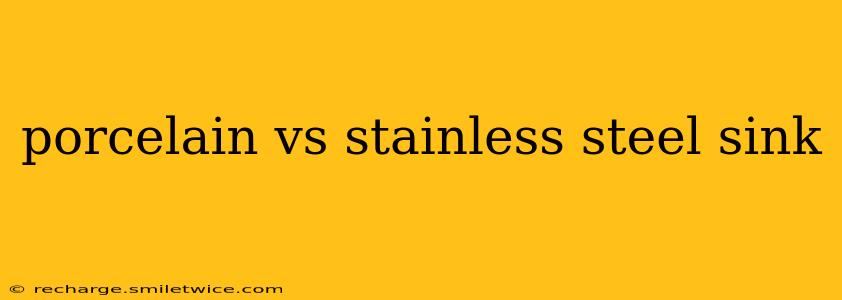Choosing the right kitchen sink can feel overwhelming. Two popular choices consistently top the list: porcelain and stainless steel. Each boasts unique advantages and disadvantages, impacting both aesthetics and functionality. This comprehensive guide will delve into the key differences, helping you make an informed decision for your kitchen.
Porcelain Sinks: Elegance and Durability
Porcelain sinks, often called ceramic sinks, offer a classic, elegant look that complements various kitchen styles. Their smooth, non-porous surface is easy to clean and resists staining, making them a popular choice for homeowners. However, their durability is a point of contention.
What are the pros and cons of porcelain sinks?
Pros:
- Aesthetically Pleasing: Porcelain sinks come in a wide array of colors and styles, allowing for customization to match any kitchen design. From farmhouse styles to sleek modern looks, there's a porcelain sink to suit every taste.
- Quiet Operation: Porcelain sinks are known for their quieter operation compared to stainless steel, especially when filling with water.
- Scratch and Stain Resistant (to a degree): While not indestructible, quality porcelain sinks are relatively resistant to scratches and stains, especially when properly cared for.
- Heat Resistant (to a degree): Porcelain can generally withstand moderate heat, but extreme temperatures can cause cracking.
Cons:
- Susceptible to Chips and Cracks: Porcelain is more prone to chipping and cracking than stainless steel, especially with impacts from heavy or dropped objects.
- Difficult Repair: Repairing a chipped or cracked porcelain sink is often costly and may not always be successful.
- Heavier than Stainless Steel: Porcelain sinks are significantly heavier than their stainless steel counterparts, potentially requiring more robust installation.
- Can Stain (if not properly sealed): Although generally stain-resistant, certain acidic substances can stain porcelain if not cleaned promptly.
Stainless Steel Sinks: Durability and Modern Appeal
Stainless steel sinks are a perennial favorite, prized for their durability and modern, clean aesthetic. Their resistance to scratches, stains, and heat makes them a practical choice for busy kitchens.
What are the pros and cons of stainless steel sinks?
Pros:
- Exceptional Durability: Stainless steel is incredibly resistant to scratches, dents, and chips, making it a long-lasting investment.
- Easy to Clean: The smooth, non-porous surface of stainless steel is easy to clean and maintain. A simple wipe down is often sufficient.
- Heat Resistant: Stainless steel sinks can withstand high temperatures, allowing for safe placement of hot pots and pans.
- Variety of Styles and Finishes: While often associated with a sleek modern look, stainless steel sinks are available in various styles and finishes, from brushed nickel to matte black.
Cons:
- Can Show Water Spots and Scratches: While resistant to many types of damage, stainless steel can show water spots and minor scratches more readily than porcelain.
- Noisier than Porcelain: Stainless steel sinks can be noisier than porcelain sinks, especially when filling with water or washing dishes.
- Can Dent: Although resilient, stainless steel sinks can dent if subjected to heavy impacts.
- Not as Aesthetically Versatile (generally): While styles are expanding, stainless steel doesn't offer the same wide range of colors and styles as porcelain.
Which Sink is Right for You? Considering Your Needs
The "best" sink ultimately depends on your individual needs and preferences. Consider these factors:
- Budget: Porcelain sinks can sometimes be more expensive, especially those with intricate designs.
- Kitchen Style: Consider the overall design of your kitchen. Porcelain might suit a traditional or farmhouse setting better, while stainless steel often complements modern or contemporary kitchens.
- Durability Needs: If you're prone to dropping things or require a highly resilient sink, stainless steel is the clear winner.
- Maintenance Preferences: If you prefer a low-maintenance sink, both options are relatively easy to clean, but stainless steel might require a bit more attention to prevent water spots.
What is the most durable kitchen sink material?
Stainless steel is generally considered the most durable kitchen sink material due to its resistance to scratches, dents, and chips. However, both porcelain and stainless steel can last for many years with proper care.
Are porcelain sinks easy to clean?
Porcelain sinks are generally easy to clean thanks to their smooth, non-porous surface. However, prompt cleaning is essential to prevent stains, especially from acidic substances.
How long do porcelain sinks last?
With proper care, a high-quality porcelain sink can last for many years, even decades. However, their susceptibility to chipping and cracking means they may not have the same lifespan as stainless steel.
Are stainless steel sinks noisy?
Yes, stainless steel sinks can be noisier than porcelain sinks due to their thinner material and the sound of water hitting the metal. This noise can be mitigated through the use of undercoating or sink mats.
By carefully weighing these factors and considering your personal preferences, you can choose the perfect sink to enhance the functionality and beauty of your kitchen.
